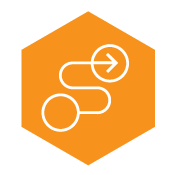Globus, a department within University of Chicago Research, provides a platform for data management. With Globus you can move, share and discover data via a single point and click interface – wherever your files live, whether they are on Midway, your laptop or a public cloud. You can manage your data from anywhere, using your existing identities, via just a web browser.
Researchers across all disciplines can benefit through the usage of Globus services, and advanced computing is not required. Globus makes data more accessible and easier to share with others across campus or with researchers at other institutions. The Midway and Midway2 clusters, as well as other systems on campus, are enabled with Globus endpoints.
All Globus services and offerings can be accessed by anyone at the University of Chicago for free. The RCC can help you put a data management plan in place.
From kilobytes to petabytes, with Globus you can efficiently, reliably, and securely move data between systems within your site or across an ocean.
All you need is an email address to share data with colleagues – Globus manages authentication and access.
The Globus Search service enables storage of metadata with fine grained access control on creation, modification, and visibility, and metadata retrieval through search queries.
Need to manage HIPAA-regulated data? Working with PII or CUI? No problem. Globus supports management of Protected Health Information (PHI), data regulated by the Health Insurance Portability and Accountability Act (HIPAA), Personally Identifiable Information (PII), and Controlled Unclassified Information (CUI).
Globus flows define actions that are executed in a specified order using “action providers” to act on resources both on the Globus platform and externally managed services. Use cases abound where automation is required to cope with growing data volumes and velocities like those generated by cryo-electron microscopes, next generation sequencers, and advanced light sources.
The Globus platform enables developers to provide robust file transfer, sharing, search, and automation capabilities within their own research data applications and services, while leveraging advanced identity management, single sign-on, and authorization capabilities.






